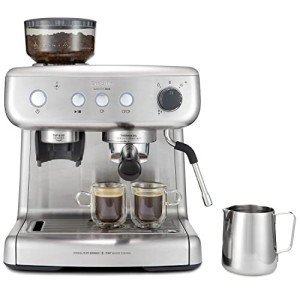9 Signs You're A High-Quality Espresso Machines Expert

The World of High-Quality Espresso Machines: A Comprehensive Guide
Espresso has become a cherished beverage amongst coffee enthusiasts worldwide, known for its rich flavor, extreme aroma, and adaptability. The heart of an excellent espresso lies in the machine utilized to brew it. High-quality espresso machines are designed to provide the ideal shot, making them a vital financial investment for coffee enthusiasts. This article checks out numerous kinds of high-quality espresso machines, their features, upkeep suggestions, and responses to often asked concerns.
Types of High-Quality Espresso Machines
High-quality espresso machines fall under numerous classifications, dealing with different choices, ability levels, and budgets. The main types consist of:
| Type of Machine | Description | Perfect User |
|---|---|---|
| Manual Espresso Machines | Needs user ability to control extraction and pressure. Provides the most control over the brewing process. | Experienced baristas and lovers |
| Semi-Automatic Machines | Integrates manual operation with automation. Highly recommended Internet site manage the grind and tamping, while the machine handles water dispersion. | Intermediate users |
| Automatic Espresso Machines | Automate the brewing process, permitting programmable brewing times and temperatures. | Casual coffee drinkers |
| Super-Automatic Machines | Have integrated grinders and are totally automated, managing whatever from grinding to developing and steaming. | Users looking for benefit |
| Commercial Espresso Machines | Developed for high volume use in cafes and restaurants, offering resilience and speed. | Company owner |
Comprehensive Overview of Each Type
Manual Espresso Machines
- Pros: Complete control over the developing procedure; can produce extraordinary quality espresso.
- Cons: Requires significant skill; time-consuming.
Semi-Automatic Machines
- Pros: Balanced control, blending manual and automatic procedures; exceptional quality espresso is still possible.
- Cons: Requires some knowledge and experience to master.
Automatic Espresso Machines
- Pros: User-friendly; lowers the finding out curve while still producing high-quality espresso.
- Cons: Still needs some understanding of coffee-making essentials.
Super-Automatic Machines
- Pros: Maximal convenience; little ability required; suitable for individuals or families who want coffee without fuss.
- Cons: Higher rate point; might do not have the fine-tuning capabilities of manual machines.
Commercial Espresso Machines
- Pros: Built for durability and efficiency; often consists of functions for high-volume turns.
- Cons: Expensive; might be overkill for home use.
Key Features to Consider
When trying to find a high-quality espresso machine, numerous crucial features must be taken into account:
- Pressure and Pump Type: Look for machines with a minimum of 9 bars of pressure, which is important for drawing out the very best taste from coffee beans.
- Boiler Type: Single, double, and heat exchanger boilers each affect how the machine performs and the speed of developing.
- Construct Quality: High-quality products such as stainless-steel are preferable for durability and aesthetic appeals.
- Alleviate of Use and Cleaning: Some machines require substantial cleansing, while others are designed for simple upkeep.
- Temperature level Control: Consistent temperature level is critical; consider machines with PID controllers for exact control.
Advantages of High-Quality Espresso Machines
Purchasing a high-quality espresso machine provides a wide range of advantages:
- Superior Quality: High-end machines enable greater control, causing tastier espresso.
- Durability: Built to last, quality machines need fewer repair work and replacements.
- Personalization: Users can enjoy a tailored experience by adjusting grind size, shot timing, and other settings.
- Increased Convenience: Automatic and super-automatic options enable enthusiasts to delight in espresso with minimal effort.
Maintenance and Care for High-Quality Espresso Machines
To keep an espresso machine functioning optimally, routine upkeep is crucial. Here are tips for keeping a high-quality espresso machine:
Descale Regularly:
- Use a descaling option every few months to prevent buildup of minerals from water, which can affect flavor and efficiency.
Clean the Brew Group:
- For machines with a detachable brew group, tidy it regularly to guarantee a tidy extraction.
Change Water Filters:
- Use a water filter and alter it as needed to reduce pollutants in your brewing water.
Daily Cleanings:
- Rinse the portafilter and group head after each use to prevent oil accumulation.
Watch on the Parts:
- Monitor seals, gaskets, and other parts for wear and tear and change them as needed.
Often Asked Questions (FAQs)
1. What is the best espresso machine for beginners?
For newbies, a semi-automatic machine typically provides a great balance of usability and control, enabling users to find out the skills necessary for making terrific espresso.
2. Are super-automatic machines worth the investment?
Yes, for those who prioritize benefit and ease over control, super-automatic machines can be a worthy investment, especially for households or hectic professionals.
3. How much should I anticipate to invest in a high-quality espresso machine?
High-quality espresso machines vary substantially in price, with manual machines starting at a few hundred dollars, while super-automatic or commercial machines can go beyond numerous thousand.
4. Can I make other coffee beverages with an espresso machine?
Yes, many espresso machines have steam wands or attachments that enable users to develop lattes, coffees, and more.
5. The length of time do espresso machines usually last?
With proper upkeep, high-quality espresso machines can last over a years, making them a long-term financial investment in your coffee satisfaction.
High-quality espresso machines yield a transformative coffee experience, whether enjoyed in your home or in a commercial setting. By comprehending the types available, their functions, and the upkeep required to keep them running efficiently, customers can make informed choices that elevate their coffee-drinking experience.

